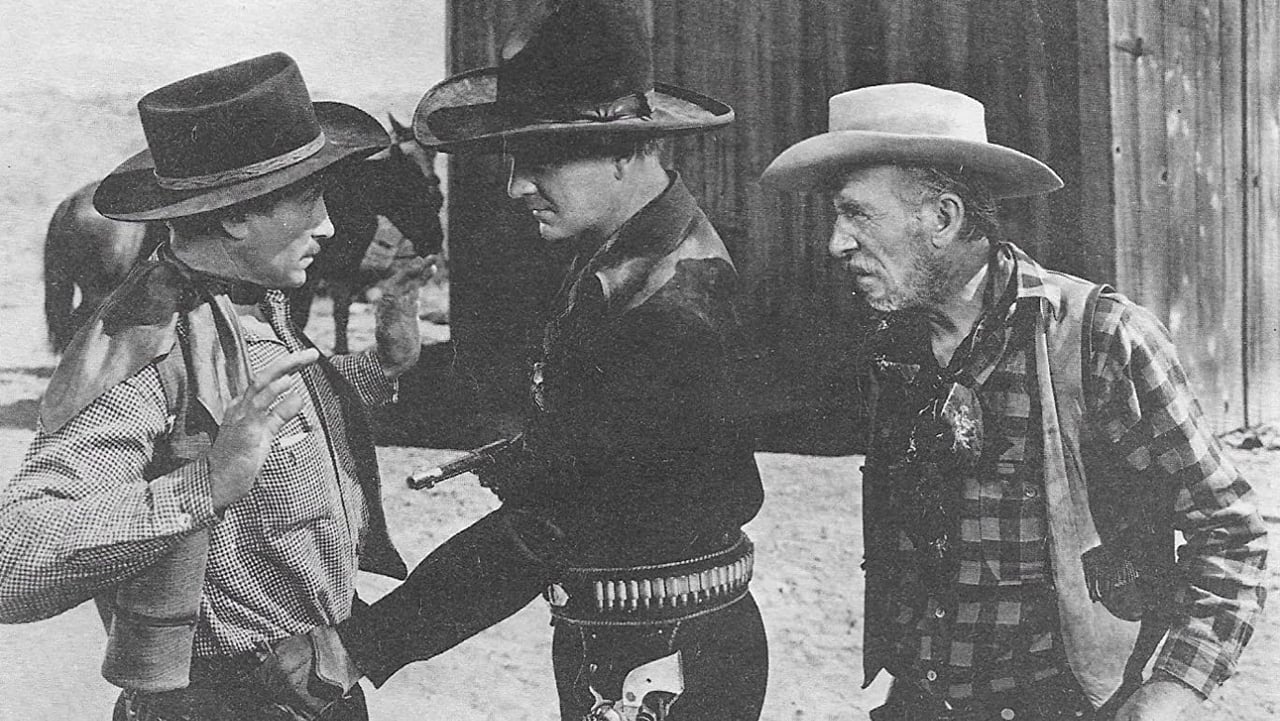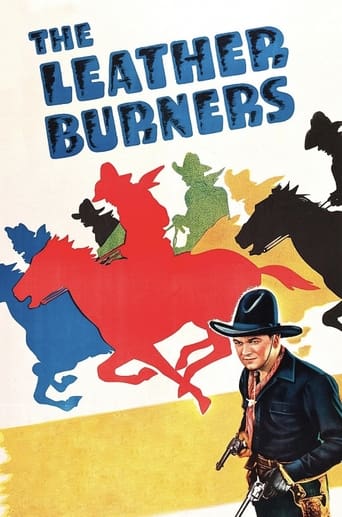Lovesusti
The Worst Film Ever
2hotFeature
one of my absolute favorites!
Motompa
Go in cold, and you're likely to emerge with your blood boiling. This has to be seen to be believed.
JohnHowardReid
The Leather Burners. United Artists, 28 May 1943, Joseph Henabery.CAST: William Boyd, Andy Clyde, Jay Kirby, Victor Jory, George Givot, Shelley Spencer, Bobby Larson, George Reeves, Hal Taliaferro, Forbes Murray, Robert Mitchum, Bob Kortman, Art Mix. 58 minutes. (Available on an excellent Platinum Disc DVD). COMMENT: For this pocket-sized (58 minutes) entry, our trio is reduced to a duo (or at most a two and a half, if you count eager beaver Bobby Larson) as Jay Kirby has a very minor role and doesn't ride with Bill and Andy at all. Despite a promising line-up of heavies led by Victor Jory, nothing much is made of them either. It's left to Hal Taliaferro to make the running and for a while there it looks like we're going to have some railroad action but this also comes to absolutely nothing,
However, the movie is of great curiosity value as it is one of only three or four sound feature films directed by silent era veteran Joseph Henabery who managed to antagonize both M-G-M boss Louis B. Mayer and Paramount's Adolph Zukor who both requested other studios to blackball him. Nevertheless, Columbia's Harry Cohn liked Henabery's spirit and persuaded Jack Warner to hide him away by hiring him to direct Vitaphone short subjects. Henabery was at liberty when his contract ran out at the end of 1939, but only Harry Sherman in 1943 and the U.S. Army Signal Corps in 1947 picked up his services. To judge by this effort, Henabery was competent enough, but lacked the ability to pace a story and bring its climaxes to a punchy close.
classicsoncall
I just picked up a very cool Christmas present for myself - a seven disc, thirty five Western movie collection featuring Hopalong Cassidy. If you're reading this any time close to when I posted this review, you might want to head over to your local Wal-Mart; that's where I got my set. Best part about the whole deal - ten bucks for all those great Hoppy flicks!This is only the second one I've seen so far, so I don't know if I'll run into this again, but this movie starts out exactly the same as "In Old Colorado" with riders on horses in a series of scenes dashing back and forth. Once the story actually settles in, we see Hoppy and sidekick California Carlson (Andy Clyde) arriving in an unnamed town, having been summoned by a former cowhand of the Bar-20 named Johnny (Jay Kirby). As head of the local Cattlemens Association, Johnny asks Hoppy to investigate cattle rustling in the territory. Town boss Dan Slack (Victor Jory), aware of Hoppy's reputation, figures he'll ingratiate himself with the newcomer and offer him a job as well.The set up for the Slack/Hoppy scenario is rather curious. Slack has one of his henchmen take a phony pot-shot at him, and when Hoppy comes to his aid, Slack pulls out his pocket watch with a scrap of lead in the shattered glass face. Hoppy notes that the bullet is a plant because it's not even warm, so decides to take up Slack's job offer to get on the inside of his operation. As a precaution, Hoppy wires a marshal in Salt Lake City inquiring about Slack, but it's intercepted by another henchman named Lafe (Hal Taliaferro). Confronting Lafe, Hoppy and California lock him in a stable knowing full well he'll make a getaway as soon as he can. When he does, and this was quite baffling to me, Hoppy and California follow him in broad daylight on horseback to Slack's hideout near the Buckskin Mine. To my thinking, Slack would have had Lafe put away for this indiscretion, but he needn't have bothered - Lafe's horse threw him over a cliff!When the town sheriff comes out to arrest Hoppy for Lafe's murder, Hoppy simply blows him off and basically tells him to pound sand. At this point I'm really scratching my head, but hey, this is Hoppy's movie. To speed things up a bit, Hoppy and California find the secret entrance to the back of the tapped out Buckskin Mine, and upon further investigation, find a herd of stolen cattle hidden inside the mine. By this time Slack comes on the scene, and is eventually waylaid by crazy old hermit Sam Bucktoe (George Givot) who lives in the mine. In turn, Bucktoe releases the cattle, they stampede, and Buctoe is killed by a cave-in caused by the rumbling cattle.All of this nonsense made it just way too easy and convenient for Hoppy to solve the mystery of the rustled cattle and earn back the trust of the cattle folks. But if you can overlook the lack of credibility in the story line, you might enjoy catching George Reeves a decade before he put on the tights as Superman. He's town attorney Harrison Brooke who has villain Slack pegged to a tee. And then, don't blink, because Robert Mitchum makes a quick appearance as another Slack henchman, but he flashes by so quickly you'll wonder who he was the rest of the movie after you recognized the familiar face.
bkoganbing
Answering a call from Jay Kirby who has settled in a nearby area with a ranch and along with others is having his cattle systematically stolen with no trace, Hoppy and California come from the Bar 20 when summoned.As part of his plan Hoppy and California go to work for Victor Jory whom we know right away as a villain. But Jory is only part of the picture.Jory has got quite an operation going with a whole gang of cattle rustlers among them future screen legend Robert Mitchum. It all involved a spy among the ranchers and a played out old gold mine.Best in this Hoppy feature is George Givot who normally is in lighter roles on the screen. He plays a miner long thought to be dead, but actually living as a hermit in his old mine and gone stark crazy with the loneliness and the dark.Definitely one of the better Hopalong Cassidy films.
rsoonsa
In 1943, following eight months without a release, the William Boyd-starring Hopalong Cassidy Western series moves to United Artists, a company devoid of those productions required to satisfy contractual conditions. U.A. signs a pact with Paramount wherein over twenty films in the can and ready for theatre showings were transferred from the latter studio to United Artists, these including the Cassidy pictures, such as this one, LEATHER BURNERS, that failed to gain widespread audience approval, principally due to a scattershot screenplay that is bogged down with unsympathetic plotting twists. A well-worn Western genre theme subject: cattle rustling, becomes a keynote for this work that is nicely detailed during its first half, largely due to the able direction of veteran of silents Joseph E. Henabery, at the helm for his sole sound feature, shot at and near Lone Pine, California, (especially in the adjacent Alabama Hills region for the many outdoor action sequences), as well as in Hollywood's Bronson Cave. Hoppy's latest protégé is Johnny Travers, former ranch hand at Cassidy's Bar 20 spread, and it is Johnny, played by Jay Kirby, who calls for Cassidy and his saddle pard California Carlson (Andy Clyde) to aid him with the mentioned rustling predicament. Hopalong and California pretend to work for Dan Slack (Victor Jory) as a ploy intended to discover a mastermind behind the illegal goings-on, but there are too many plot line threads for even this dauntless pair to effectively tackle, and this surfeit, in addition to a skimpy budget, sinks the piece during its second half. Nevertheless, some interesting elements appear during the course of this essentially basic Western programmer: it marks the third appearance in a Hopalong Cassidy film for each of two young players beginning their careers, Robert Mitchum and George Reeves; it profits additionally from the final score composed for a feature motion picture by Samuel Kaylin. Jory handily garners acting laurels for his smooth performance as a leading representative of the Forces of Evil.

